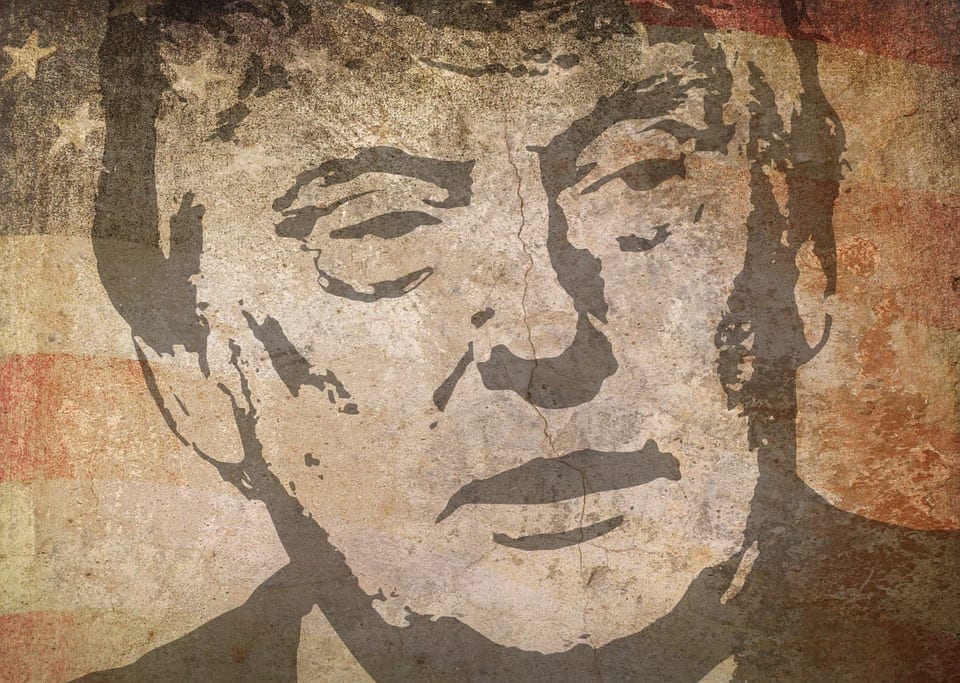by Timothy R. Jones
L3 undergraduate
This roundtable, hosted by the University of Lincoln, was made up of five academics who had gathered to try and establish how a man who was pitted as the joke candidate from the outset of the 2016 election could ascend to the Office of President of the United States of America. The panel placed a heavy emphasis on historical precedent in explaining the rise and successes of Donald J. Trump, contextualizing the major issues of his campaign and early presidency against the backdrop of past events.
The first of these issues was the ‘Crooked Hilary’ phenomena, which Trump used to demean his opponent during the presidential race. Dr Sinead McEneaney (University of St. Mary’s, Twickenham) argued that this had deeper roots as part of an American popular culture which has repeatedly portrayed women as untrustworthy. Dr McEneaney drew our attention to several images from the Second World War that contained a ‘careless talk costs lives’ message, each emphasizing that it was the wives and daughters of America who were responsible for recklessly spreading sensitive information, and not its male population. Dr McEneaney then brought us forward to 1996 and to an article which criticized then First Lady Clinton as dishonest following the attempt to impeach her husband, President Bill Clinton. The emphasis on female deceitfulness and the idea that Hilary Clinton was guilty by association were evident in a 2016 CNN poll which proclaimed that 68% of Americans viewed her as too ‘untrustworthy’ to hold the office of President.

Alongside Trumps’ lampooning of ‘Crooked Hillary’ came two other powerful sound bites from his campaign – namely, ‘That ban’ and ‘That wall’. According to Dr Andrew Heath (University of Sheffield), both of these ideas actually have historic origin in American political ideology. Dr Heath argued that we can understand Trump’s mentality by looking at the life and works of Henry C. Carey. Carey was a nineteenth-century American economist who advocated high foreign trade tariffs as part of a protectionist policy, which he saw as shielding America from foreign competition and safeguarding the jobs of the American working classes. This policy was used to justify the Chinese exclusion act of 1882, which sought to limit Chinese immigration for reasons, amongst others, of national security. Dr Heath drew comparisons between this protectionist act and the wall-building rhetoric of the new President. It seems that Trump wants to return the US to a more equal footing in terms of having free trade on the one hand, and protectionism on the other. The typical suffix of ‘and Mexico are gonna’ pay for it’ can also be viewed through this protectionist analysis, given that the ideology aims to defend borders without burdening the American tax-payer.
Dr Finn Pollard (University of Lincoln) focused on the bitter 1800 election between incumbent President John Adams and his successor Thomas Jefferson, in order to highlight how historical precedent existed for the kind of vicious arguments exchanged between President Barack Obama and Trump in the lead up to the 2016 election. Dr Pollard explained how Jefferson slanderously accused Adams of being a ‘monarchist’, while newspaper articles revealed to readers Jefferson’s scandalous affair with his negro slave. The message from history here is that similarities to the spirited rivalry shared by Obama and Trump, as well as the personal scandal which encircled the 2016 election, can be detected much further back in the past. And keeping with the theme of politics, Dr Andrew Defty (University of Lincoln) examined how Speaker of the House of Commons, John Bercow, has sought to deny Trump the opportunity to address the British parliament. Although critics have argued that it was unconstitutional for the speaker to make his opinion known on this subject, it too echoes past events. Dr Defty remarked how Bercow’s rejection of Trump was viewed as a victory by those who refuse to acknowledge his authority. Historical precedent exists for this attitude as from George Washington to the present day, only two Presidents have been accorded the honour of addressing parliament – Clinton and Obama respectively.
